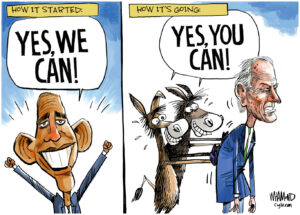Ahmadinejad and the Limits of American and Israeli Power
Iranian President Mahmoud Ahmadinejad, the Middle East’s populist answer to the American tea party, has stirred controversy with his trip to Lebanon, which will begin Wednesday.Iranian President Mahmoud Ahmadinejad has stirred controversy with his trip to Lebanon, which will begin Wednesday.
We’re thrilled to announce the return to Truthdig of Juan Cole, an old friend who was featured in our first issue and helped forge our mission. The past decade has been defined by the West’s relationship with the Middle East. There is no more respected scholar of that region than Juan, whose writing has brought sanity and insight to a public discourse so often shaped by ignorance and misinformation. Look for Juan’s column every other Tuesday on Truthdig and be sure to visit his hub for more.
Iranian President Mahmoud Ahmadinejad, the Middle East’s populist answer to the American tea party, has stirred controversy with his trip to Lebanon, which will begin Wednesday. He is planning to visit villages in southern Lebanon on the border with Israel that have been rebuilt with Iranian aid after Israeli incursions and wars, the last in 2006. Ahmadinejad’s theatrical politics often make him a laughingstock, but his trip is intended to make the serious point that Tehran can stand up to Western sanctions and thwart attempts to box the Islamic Republic in.
Ahmadinejad is a major thorn in the side of U.S. President Barack Obama and Israeli Prime Minister Binyamin Netanyahu. Iran rejects the legitimacy of Israel, one of the pillars of American policy in the Middle East (though Ahmadinejad has never actually threatened to wipe Israel off the face of the map, a charge based on a mistranslation). Iran supports nativist paramilitaries such as that of Hezbollah in Lebanon, Hamas in Gaza and the Badr Corps in Iraq. Most seriously, Iran is pursuing the enrichment of uranium, which it says is for civilian power generation. The U.S. and Israel, however, fear the program could end up being dual-use and result in, at the least, the ability to assemble a nuclear warhead on short notice.
Iran, despite draconian U.N. and U.S. sanctions, remains a major player in the region. Shiite Iran has just rallied the Shiite religious parties in Iraq to support its favored candidate for prime minister, Nouri al-Maliki of the Islamic Mission Party. Syria and Turkey have warm relations with the Ahmadinejad government. Even Egypt has just announced a resumption of direct flights between Cairo and Tehran.
Ahmadinejad’s trip to Lebanon was denounced as destabilizing by Israel and clearly is unwelcome to the United States, which fears it will result in an arms deal between Beirut and Tehran. Ahmadinejad will meet with all the leading Lebanese politicians. Most controversially, the Iranian president will visit Shiite villages right on the border with Israel that have suffered repeated Israeli incursions and were occupied for nearly two decades by the Israeli military. Hezbollah fighters, with Iranian backing, waged a successful guerrilla war against Israeli occupation, resulting in the first Israeli retreat under fire from territory it had seized in war.
Ahmadinejad has just pledged to invest nearly half a billion dollars in Lebanon’s electricity and water systems to aid the economy, which has grown 8 percent this year and has made impressive strides in rebounding from the disastrous effects of the 2006 Israel-Hezbollah War. Iran is a major backer of the Hezbollah Party, though it does not need Tehran to function. Hezbollah is a bona fide Lebanese political party and is part of the current national unity government, with two Cabinet seats and influence over policy. Its small paramilitary of a few thousand fighters, backed by an arsenal of small rockets, has been recognized by the Lebanese government as a sort of national guard for the south of the country. A crisis between Hezbollah and the government of the Sunni Muslim prime minister, Saad Hariri, looms, since a tribunal may blame Hezbollah operatives for the 2005 assassination of the prime minister’s father, Rafiq Hariri. Ahmadinejad may hope to broker an agreement that would forestall civil conflict between Shiites and Sunnis.
Hezbollah leader Hassan Nasrallah unrealistically credits Iran’s aid alone with Lebanon’s impressive economic rebound since the 2006 Israeli war on the small country. (Qatar, Saudi Arabia and Europe all played important roles here, as did the resilient tourism sector.) He says that Ahmadinejad declined to grandstand on that aid, however, quoting the Iranian president as saying, “I do not want to make the Lebanese feel they are indebted to Iran,” and, “we are the ones who must thank the Lebanese for their perseverance and for the resistance and for the great victory …” that they bestowed on the Muslim world by resisting Israel in 2006. Israel was widely criticized for deploying disproportionate force when it mounted a massive bombing campaign on all of Lebanon and its infrastructure in response to a border skirmish with Hezbollah fighters that had left Israeli soldiers dead.
Iran’s ability to thumb its nose at the U.S., Israel and Western Europe is rooted in its vast petroleum and natural gas reserves. After a difficult 2009 because of the world economic crisis, oil prices are up 15 percent in 2010 on Asian demand. The long-term impact of the new U.N. sanctions approved June 9 is questionable. South Korea has just found a way to sidestep the effect of the sanctions on its exports to the Islamic Republic. China has paid virtually no attention to the U.S. sanctions though it has slightly reduced its dependence on Iranian petroleum over the past year. Turkey, which, like South Korea, does $10 billion a year in commerce with Iran, is openly defiant of the U.N. and U.S. sanctions, and intends to triple its foreign trade with the Islamic Republic over the next five years. Turkey has successfully negotiated a free trade zone with Lebanon, and is seeking to expand it to Jordan and Syria, and Iran will likely benefit from this European Union-like Middle Eastern trade bloc as well.
The first visit of a president of the Islamic Republic to Beirut signals that neither the U.S. nor Israel is hegemonic in the region, and that Iran is willing to brave even a Spartan existence under sanctions for the sake of its independence and its projection of influence in the Middle East. Right wing Christian critics of Ahmadinejad’s trip charge Tehran with attempting to signal that Iranian territory extends into southern Lebanon. But many long-suffering southern Lebanese hope Ahmadinejad will show Israel the new limits of its power.
Juan Cole, the Richard P. Mitchell Collegiate Professor of History at the University of Michigan, maintains the blog Informed Comment. His most recent book, just out in paperback, is “Engaging the Muslim World.”
Your support matters…Independent journalism is under threat and overshadowed by heavily funded mainstream media.
You can help level the playing field. Become a member.
Your tax-deductible contribution keeps us digging beneath the headlines to give you thought-provoking, investigative reporting and analysis that unearths what's really happening- without compromise.
Give today to support our courageous, independent journalists.






You need to be a supporter to comment.
There are currently no responses to this article.
Be the first to respond.